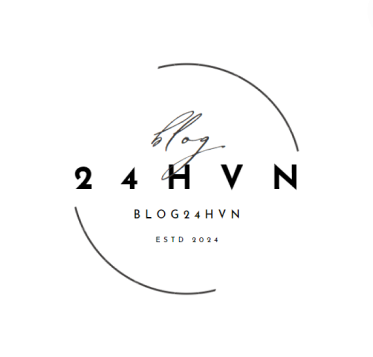Whenever mentioning Nha Trang, the coastal city in South Central Vietnam, tourists will immediately think of a beautiful city with stunning beaches and luxurious resorts. However, Nha Trang is also famous for the breath of culture in the daily life of the locals. Coming to Nha Trang, tourists will be overwhelmed by the historical constructions, traditional villages and crowded markets. If you are planning to go shopping in Nha Trang, Dam Market (chợ Đầm) is a great choice, where you can admire the customs remaining in a modern city.
I. History of Dam Market
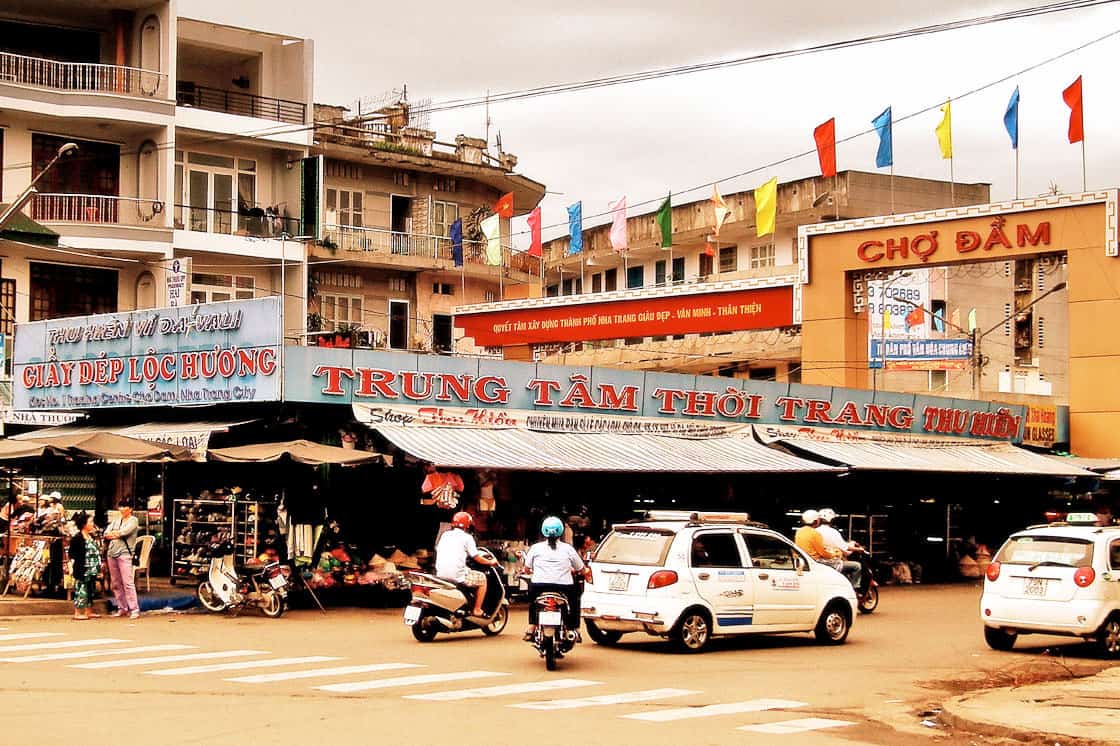
The area of Dam Market used to be a 7-hectare swamp which stretched to the estuary of Nha Trang River. On the two sides of the swamp were the villages of the local residents. At the end of the swamp, which is now Phan Boi Chau Street, was an old market built temporarily in 1908 for trading activities of the villagers. Due to its location, this market was called Dam Market, or Cua Market (since it was located at the river estuary).
Gradually, the population in this area was so crowded and the houses were so close to the others that the surrounding area was polluted. That situation made the redevelopment much more urgent than ever. In 1961, the first outline project was set up to replace the old market with a new one. In 1964, another project was proposed by architect Le Quy Phong, which was the core to the construction of Dam Market that we can see today.
While both the two projects had not been implemented, on September 16th, 1968, a fierce fire destroyed 126 houses in this area. The pressing situation urged the officials to build a new market that was much more spacious than the old one. On April 12th, 1969, the construction of Dam Market started on the area of the nearby swamp. During 6 months laters, there were totally 350,000 cubic meters of sand used to fill up the swamp. Based on the blueprint of architect Le Quy Phong in 1964, some details were adjusted and added to the construction. In 1972, the construction of Dam Market was completed.
In 1975, after the reunification, instead of the disorder of the society in the period between two systems, the trading activities in Dam Market still remained. However, the appearance and order of this market decreased. To deal with the situation, a plan to restore Dam Market was approved. On February 3rd, 1980, at the 50-year celebration of the Vietnam Communist Party, the new Dam Market was completed and inaugurated.
After more than 40 years in use, Dam Market has been seriously downgraded. A new Dam Market was built right on the side of the old one, and since March 31st, 2021, the whole Dam Market will have been moved to the new area. However, the old Dam Market with its unique construction is still an indispensable of Nha Trang City, which is an ideal nextstop of tourists when going shopping in Nha Trang.
II. Highlights and Architecture of Dam Market
1. Architecture
Dam Market is known as the first and most famous market in Nha Trang. Located in a favorable location in the center of this city, enclosed by main roads, Dam Market is considered as the most bustling trading center in this coastal city.
The construction of Dam Market was inspired by the shape of a lotus flower. The whole market is in a round shape with the diameter up to 66.5 meters. Due to its shape, the market is also called Round Dam Market. Dam Market has two floors; the area of the second floor is smaller than the ground floor. The total area of the two storeys is 5,270 square meters, which can contain up to 3,000 people at a time.
From afar, the construction of Dam Market can still capture the attention of visitors thanks to its round shape. The roof of this market is like the undulating waves of the sea, while others say that it is like the pistil of the lotus. Thanks to the exclusive architecture, Dam Market is among the most famous places of interest attracting tourists coming to this appealing coastal city. Dam Market is not just a market of buying and selling, it is also a symbolic construction that has attached the daily life of the locals for more than a half century.
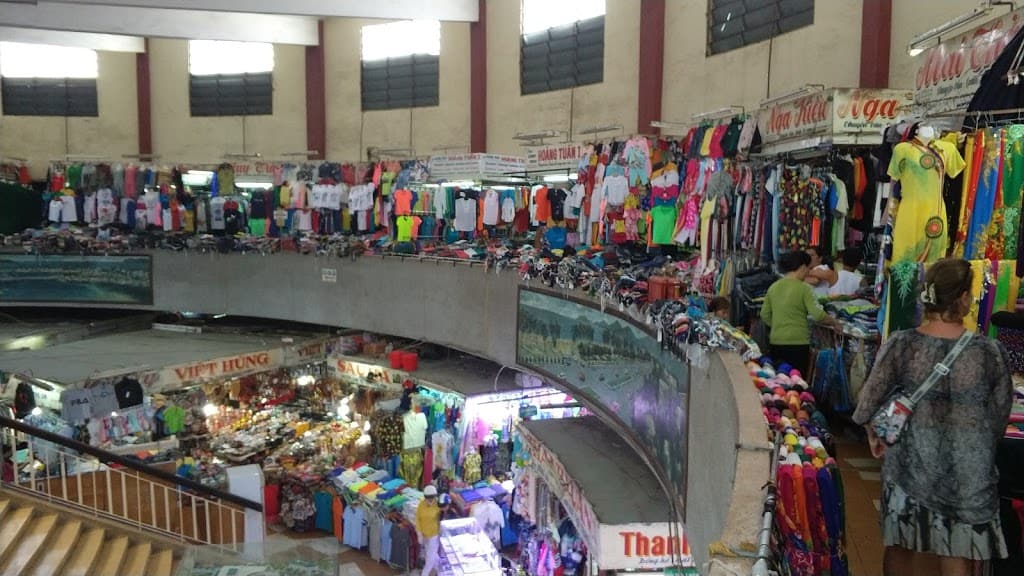
2. Structure
Due to the large size, the space of Dam Market is divided into three main areas so that tourists can find the goods they need in the right place. The three main areas of Dam Market are the center, left side and right side parts.
The center of Dam Market is the place where tourists can find essential items such as consumer goods, clothes, cosmetic products and household goods. Besides, there are various kiots that sell souvenirs and handicraft products so that you can buy some as gifts for your friends and relatives.
The left side of Dam Market is the world of seafood. The seafood here is caught in Nha Trang sea and shipped immediately to the market to ensure the freshness of the seafood. In addition to the fresh seafood, there are many kinds of dry seafood you can find in this area, from shrimp, squid and types of sea fish.
If you are interested in the local cuisine, the right side of Dam Market is just for you. Coming to Nha Trang, having a try on the local dishes at a traditional market is a must-do activity for all tourists. From grilled meat rolls, seafood noodles to mango rice papers and fish sauce, this area of Dam Market is such a paradise for all food lovers.
III. What to Buy and Eat at Dam Market?
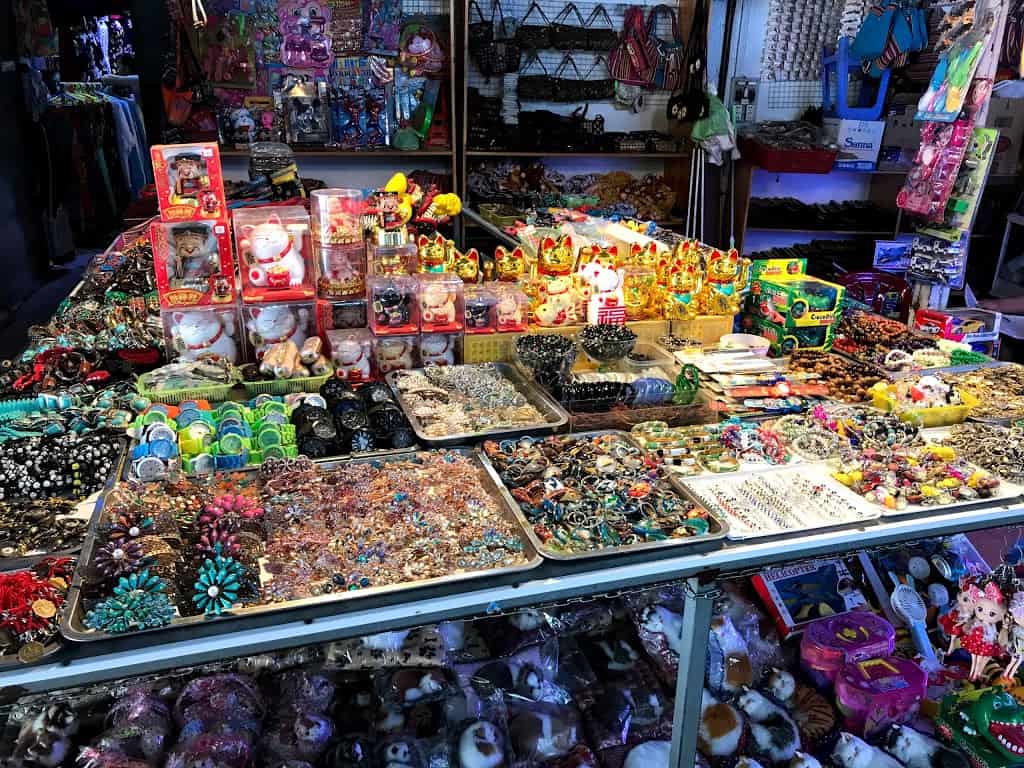
1. Fabric and clothing
Clothes and plentiful types of fabric are sold at the center area of Dam Market. Most of the clothes there are domestic or Chinese products, so the price is quite reasonable. Clothes there are in many colors and kinds, which are suitable for different ages. You can buy some T-shirts or hats to prepare for your trip to the beach of Nha Trang. Or you can also buy fabric at this market and take it to a tailor-made shop nearby to have them made your own costume.
2. Souvenirs
Also at the center of Dam Market, you can find a wide range of souvenirs that can remind you about your trip to Nha Trang. Compared to other tourist attractions, the price of souvenirs sold at Dam Market is much more pocket-friendly. There you can buy the handicraft products of traditional villages in Khanh Hoa, artificial pearls, postcards, pottery, handmade items and so on. Clothing, fabric and dry seafood are also popular types of souvenirs that are chosen by tourists.
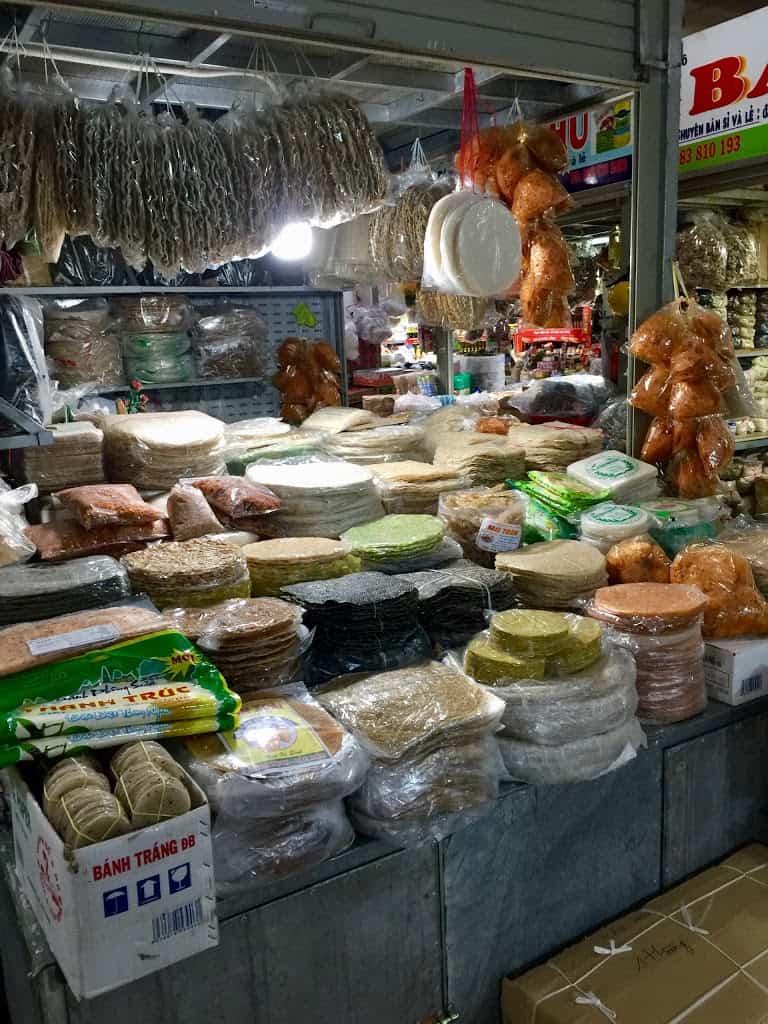
3. Seafood
It is such a pity that you come to Nha Trang without dropping in at a local market to buy some seafood. Thanks to the favorable location of Dam Market, you can find plentiful types of seafood there, from crabs, shrimp, sea snail, lobster, tuna, mackerel, herring and other fish species. In addition, dry seafoods at this market are diverse, and some must-buy types are half-dried fish, dried cuttle-fish and dried seahorse.
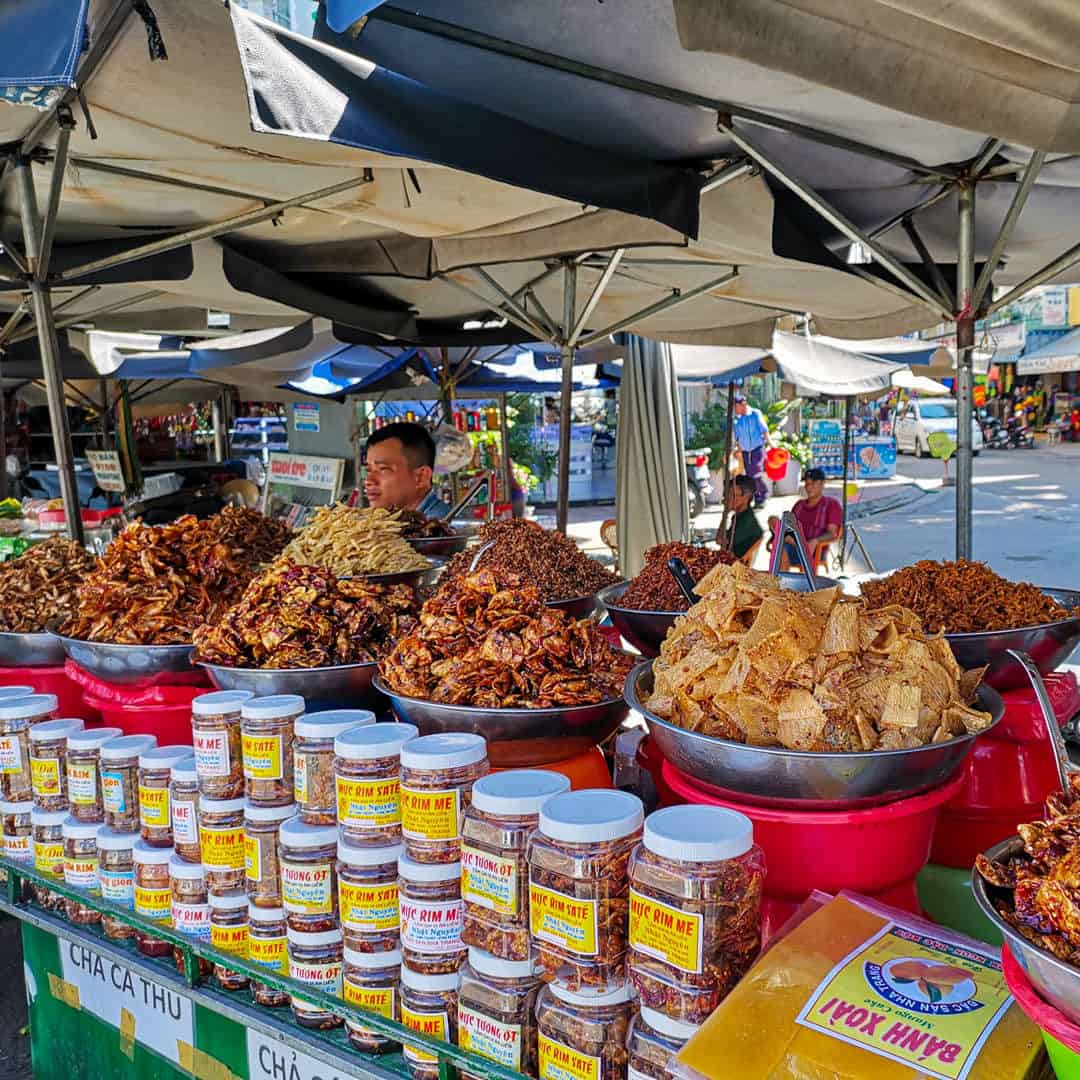
4. Local specialties
The dishes in any traditional markets you go to are all typical for Vietnamese traditional cuisine, and Dam Market is not an exception. Nha Trang has long been famous for its specialties that are brought to all regions along Vietnam. Though these specialties can be found in other cities, trying the food right in its homeland is an absolutely different experience. At Dam Market, you can enjoy the flavor of grilled meat rolls, mango rice papers, jellyfish noodles, squid pancakes and fish salads. These dishes contain all the flavors of Nha Trang sea and the quintessence of the local cuisine.
IV. How to Get to Dam Market?
Dam Market is about 2 kilometers to the north of 2/4 square, which is considered as the center of Nha Trang city. To get to Dam Market, you can go by bike, motorbike, taxi and even by walk. From the square on Tran Phu Street, you follow the road to the north until you reach the junction with Le Loi Street. There you turn left and follow the road until you reach Ben Cho Street, which is the location of Dam Market.
It will take you about 5 minutes to go by motorbike or taxi, and 30 minutes to walk to Dam Market. On the way, you can contemplate the beauty of Nha Trang beach since Tran Phu Street is one of the most impressive coastline in Nha Trang.
V. Extra Tips
- You should remember to ask the price first before deciding to get an item at Dam Market.
- The first and foremost skill that you need to learn when entering a Vietnamese market is bargaining. Though most of the kiots there sell goods with reasonable prices, some others do not. So don’t forget to bargain whenever you find the price unreasonable.
- Normally, you should propose a half price compared to the offered price of the sellers there. If they do not agree with your proposal, it would be better for you to lay the items down and move to another store.
- In case you are not confident enough to bargain the price, you should go with a local tour guide who can help you to buy the product at Dam Market with comparative price.
- You should not buy electrical or technological products at Dam Market. Most of these products are not the authentic ones and there is no warranty for these goods.
- If you want to buy fresh seafood, the early time in the morning is the most suitable time. Dam Market opens quite early in the morning, so you should also wake up early to go to the market.
- Since Dam Market is crowded all the time, there may be some pickpockets mixing with the disorderly crowd. Remember to keep an eye on all your belongings, especially cell phones and wallets or purses.
While Ben Thanh Market is a symbol of Ho Chi Minh City and Hanoi has Dong Xuan Market, Nha Trang is also famous for its Dam Market. This market is not simply a market for trading activities of the local residents in Nha Trang, it is also a symbolic construction that has accompanied this coastal city for nearly half a century. Inside the round-shaped wall of Dam Market is the long-lasting culture of this area, which is found in every store, every product. Not only that, this market is also a great choice for tourists to enjoy their shopping journey in Nha Trang.

